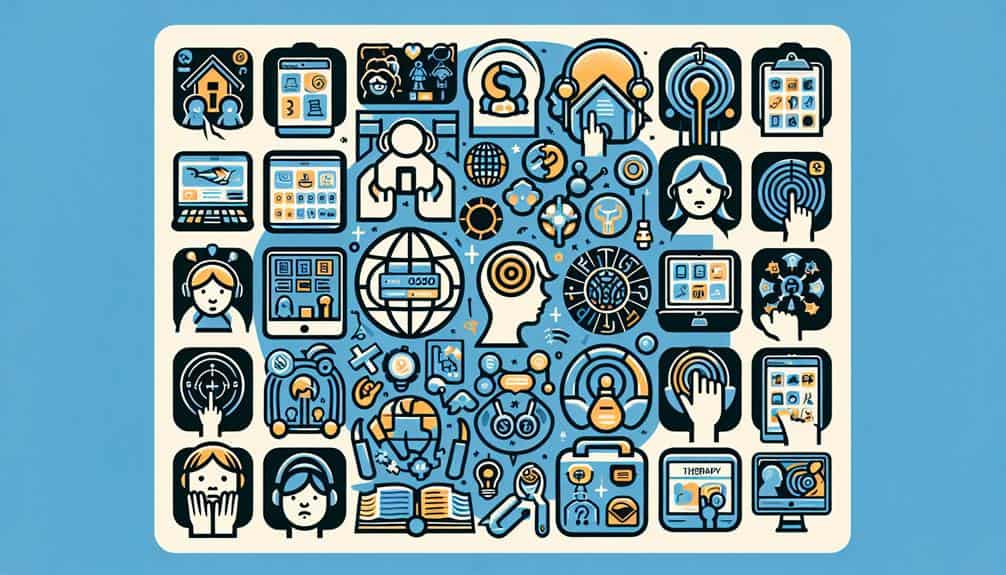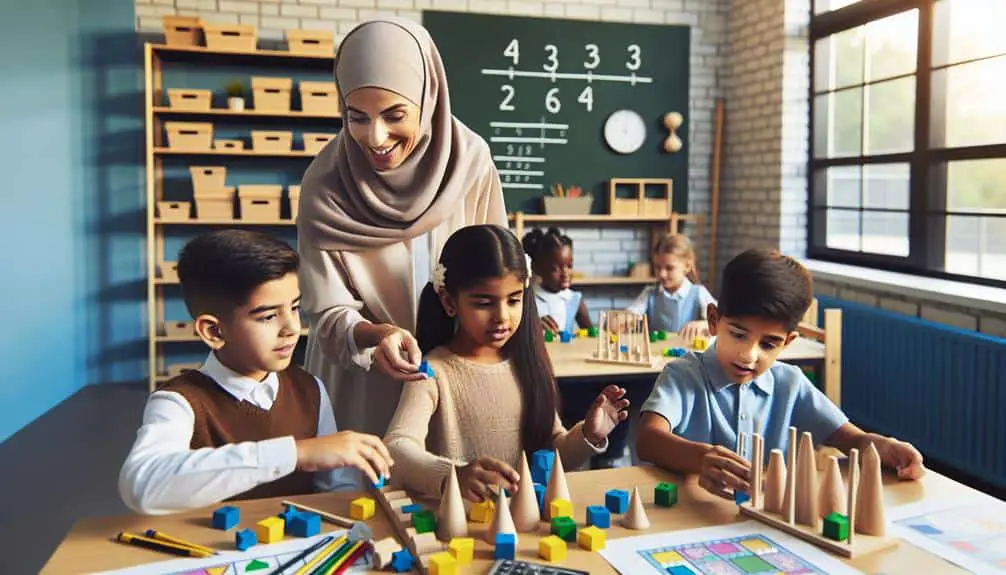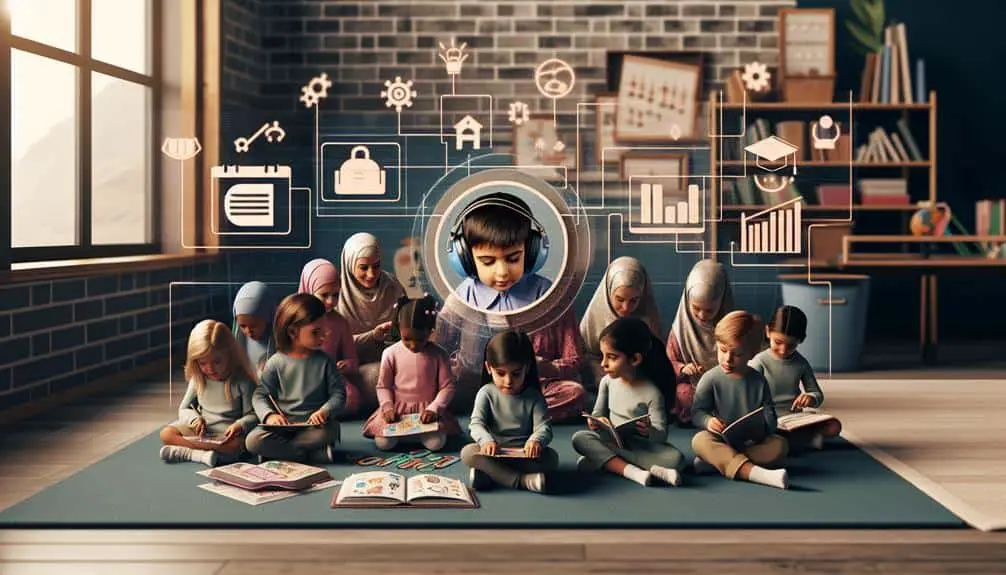Including life skills in special needs homeschooling is essential for nurturing independence, confidence, and personal growth. Teaching daily routines like cooking and budgeting not only boosts self-esteem but also equips individuals with practical skills for real-world success. Tailoring the curriculum to cater to individual needs and focusing on building a strong foundation for essential life skills is key. By emphasizing practical applications in daily life, such as managing personal hygiene and household chores, special needs individuals can enhance their independence and readiness for the future. These skills play an important role in promoting long-term success and overall well-being.
Key Points
- Fosters independence, confidence, and self-reliance.
- Enhances practical daily living abilities.
- Promotes long-term success and personal growth.
- Prepares for real-world independence and responsibilities.
- Cultivates essential life skills for future readiness.
Importance of Life Skills Training
Including life skills training in your special needs homeschooling curriculum is essential for fostering independence and self-sufficiency in your child. Daily routines play an important role in developing functional independence. By incorporating activities like making the bed, preparing simple meals, or organizing personal belongings into your child's schedule, you aren't only teaching practical skills but also instilling a sense of accomplishment and routine that can greatly benefit their personal growth.
Moreover, focusing on life skills cultivates self-confidence in your child. As they master tasks like brushing teeth independently or managing money, they build a sense of competence that translates into other areas of their life. Encouraging and praising their efforts in these daily tasks can boost their self-esteem and resilience, empowering them to face challenges with a positive attitude.
Tailoring Curriculum for Individual Needs
When homeschooling a child with special needs, it's essential to create customized learning plans that cater to their individual requirements. By tailoring the curriculum to meet their specific needs, you can promote personalized skill development and foster their overall growth.
Customized Learning Plans
Tailoring curriculum to meet the unique needs of each individual is a fundamental aspect of creating effective customized learning plans for special needs homeschooling. When developing customized learning plans, it's essential to embrace individualized approaches that cater to the specific skill development requirements of each learner. By recognizing and addressing the diverse learning styles, strengths, and challenges of your child, you can create a supportive educational environment that maximizes their potential.
Consider starting by evaluating your child's current abilities and areas where they may need additional support. This examination can help you identify the most critical skills to focus on and tailor the curriculum accordingly.
Personalized Skill Development
To create a personalized skill development plan for your child in special needs homeschooling, it's essential to assess their individual strengths and challenges thoroughly. By taking an individualized approach to skill development, you can tailor the curriculum to meet your child's specific needs and abilities.
Here are some key points to take into account:
- Identify Strengths: Recognize what your child excels at to build upon their existing skills.
- Address Challenges: Work on areas where your child may need extra support or guidance.
- Set Realistic Goals: Establish achievable objectives that promote personalized growth.
- Hands-On Learning: Engage in practical activities that enhance real-world application of skills.
- Celebrate Progress: Acknowledge and celebrate even small achievements to motivate continued learning and development.
Through this personalized approach to skill development, you can create a nurturing environment that fosters your child's overall growth and empowers them to thrive in their unique learning journey.
Enhancing Independence and Confidence
Developing essential life skills is a fundamental aspect of homeschooling for individuals with special needs, as it fosters a sense of independence and confidence that can greatly benefit their overall well-being. By focusing on self-reliance and empowerment, you can help your child build the necessary skills to navigate daily tasks more independently.
Encouraging self-esteem and self-sufficiency through practical activities tailored to their abilities can have a profound impact on their confidence levels. Teaching life skills such as personal hygiene routines, basic cooking, or money management can provide a sense of accomplishment and boost self-esteem.
As your child masters these skills, they become more self-sufficient, enhancing their belief in their capabilities. This newfound independence not only benefits them practically but also emotionally, instilling a sense of confidence that can positively influence various aspects of their life.
Practical Applications in Daily Life
Incorporating practical applications in daily life to reinforce the acquisition of essential life skills for individuals with special needs in homeschooling is crucial. Hands-on learning experiences and real-world scenarios play an important role in helping individuals with special needs develop everyday tasks and functional skills. By integrating these practical applications into daily routines, you can effectively enhance their independence and confidence.
Here are some ways to implement this approach:
- Cooking Together: Engage in meal preparation activities to teach cooking skills and promote independence in the kitchen.
- Community Outings: Plan trips to the grocery store or local market to practice money management and social interaction skills.
- Household Chores: Assign age-appropriate chores like setting the table or folding laundry to instill a sense of responsibility.
- Personal Hygiene Practice: Create routines for bathing, grooming, and dressing to develop self-care abilities.
- Budgeting Exercises: Introduce basic financial concepts through activities like creating a budget for personal expenses.
Building Essential Life Skills Foundation
Let's start by focusing on strategies to acquire essential life skills, incorporating methods that are practical and tailored to individual needs.
By building a solid foundation in these skills, you can work towards achieving long-term goals of independence and self-sufficiency.
Skill Acquisition Strategies
Start by identifying the essential life skills that your child needs to develop for independent living.
When focusing on skill acquisition strategies, consider implementing the following techniques to help your child build a strong foundation for essential life skills through hands-on learning opportunities:
- Modeling Behavior: Demonstrate the desired skills yourself, as children often learn best through observation.
- Interactive Activities: Engage your child in interactive tasks that require them to practice the skills in a practical setting.
- Repetition and Practice: Encourage regular practice to help reinforce the learning and improve skill proficiency over time.
- Breaking Down Tasks: Break down complex skills into smaller, manageable steps to make learning more achievable.
- Positive Reinforcement: Offer praise and rewards to motivate your child and positively reinforce their efforts in acquiring new skills.
Practical Application Methods
To establish a strong foundation for essential life skills in your child's homeschooling journey, focus on practical application methods that emphasize hands-on learning experiences. Hands-on practice is key in helping your child grasp important life skills effectively.
Create real-life scenarios within your homeschool environment that mimic everyday situations to provide your child with opportunities to practice these skills in a safe and supportive setting.
Engage your child in activities such as cooking meals together to teach kitchen skills, setting up a simple budget to introduce financial literacy, or organizing their belongings to develop organization skills. These hands-on experiences not only make learning more engaging but also help your child understand the practical application of the skills they're acquiring.
Long-Term Independence Goals
Establishing a solid foundation for long-term independence involves systematically building essential life skills that will empower your child to thrive in various aspects of daily living. It's crucial to focus on independent living and essential skills to guarantee your child's future planning and self-sufficiency.
Here are key elements to contemplate:
- Daily Living Skills: Teach tasks like cooking, cleaning, and personal hygiene to enhance your child's independence in managing daily routines.
- Social Skills Development: Work on communication, social cues, and relationship-building to foster meaningful connections and interactions.
- Financial Literacy: Educate your child on budgeting, saving, and understanding money to prepare them for financial independence.
- Time Management: Help your child learn to prioritize tasks, set goals, and manage their time effectively for increased productivity.
- Problem-Solving Skills: Encourage critical thinking, decision-making, and resilience to empower your child to tackle challenges confidently.
Promoting Long-Term Success
Encouraging the development of essential life skills is crucial for fostering long-term success in special needs homeschooling. By focusing on future readiness and personal growth, you're laying a strong foundation for sustainable success and life preparation.
These life skills not only enhance day-to-day living but also prepare individuals for independence in the future.
Incorporating activities that promote personal growth, such as decision-making exercises and communication skills development, can empower individuals to navigate various aspects of life confidently. Teaching time management and organizational skills fosters future readiness, enabling individuals to handle responsibilities and tasks effectively.
Sustainable success in special needs homeschooling comes from equipping individuals with the tools they need to thrive independently. By emphasizing life preparation through practical skills training, you're setting the stage for long-term success.
Real-World Preparation for Future
Preparing individuals with special needs for the real world involves equipping them with practical skills that facilitate independence and success in daily living. As you focus on future success and independence skills, here are key areas worth exploring:
- Financial Literacy: Teaching budgeting, understanding money management, and making wise purchasing decisions can empower individuals for financial independence.
- Cooking Skills: Learning to prepare simple meals not only promotes healthy eating habits but also fosters self-sufficiency in daily life.
- Transportation Independence: Mastering skills related to public transportation or driving can enhance mobility and freedom.
- Time Management: Developing strategies to manage time effectively aids in meeting deadlines, appointments, and responsibilities.
- Problem-Solving Abilities: Cultivating problem-solving skills helps navigate challenges and promotes resilience in facing obstacles.
Frequently Asked Questions
How Can Life Skills Training Benefit Special Needs Homeschooling?
Imagine life skills as stepping stones in a flowing river, guiding you through the currents of social interactions, problem-solving, communication, and organization. They provide stability and confidence in traversing the waters of special needs homeschooling.
What Strategies Can Be Used to Tailor Curriculum for Individual Needs?
To tailor curriculum for individual needs, focus on individualized learning plans. Incorporate adaptive techniques like visual aids, hands-on activities, and technology. Be patient, understanding, and flexible in your approach to guarantee effective and engaging learning experiences for your child.
How Do Life Skills Enhance Independence and Confidence?
Mastering life skills is vital for independence and confidence. Did you know, 85% of individuals with disabilities feel more empowered when equipped with essential life skills? Practice skills daily to boost autonomy and self-assurance.
What Are Some Practical Applications of Life Skills in Daily Life?
Incorporate cooking skills to prepare meals independently. Develop personal hygiene routines for self-care. Utilize time management techniques for daily tasks. Enhance communication skills to express needs effectively. These practical applications foster independence and confidence in daily life.
How Does Building a Life Skills Foundation Promote Long-Term Success?
Building a life skills foundation fosters independence and long-term success. By mastering essential tasks, you gain confidence and empowerment. These skills equip you to navigate daily challenges, boosting your ability to thrive in the future.



